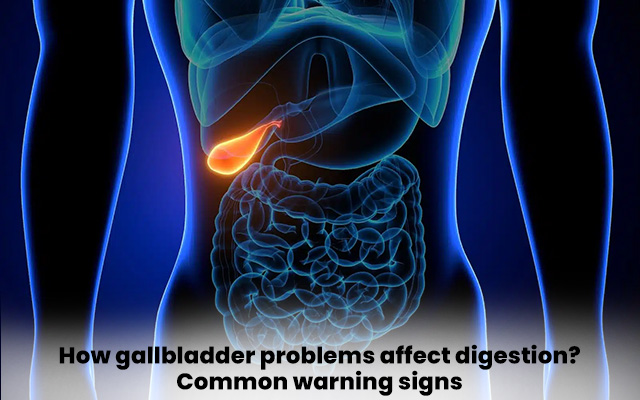The gallbladder is a small organ located just under the liver, and its job is pretty simple but essential — it stores bile, which helps in digesting fats. However, when the gallbladder isn’t functioning properly, it can cause a variety of digestive problems.
Gallbladder issues are more common than many realize, and they can disrupt the entire digestive process. In this blog, we will dive into how gallbladder problems affect digestion, how to identify the warning signs, and how to manage them effectively.
What Are the Early Warning Signs of Gallbladder Problems?
The early warning signs of gallbladder problems often start off as mild discomfort, which many people might ignore. However, if left untreated, these signs can worsen over time. Some of the common early signs include:
- Pain in the Upper Right Abdomen – Often felt after eating fatty or greasy foods, this pain can range from mild to severe and may feel like cramping or a sharp stabbing sensation.
- Nausea or Vomiting – If you experience nausea or vomiting after eating, it could be a sign that your gallbladder is struggling to release bile efficiently.
- Indigestion or Bloating – Feeling bloated or having trouble digesting food after meals may also signal a gallbladder issue.
- Change in Stool Colour – Stools may appear lighter or clay-coloured, indicating that the bile isn’t being processed properly due to a gallbladder problem.
What Are the Symptoms of an Irritated Gallbladder?
When the gallbladder becomes irritated, it can lead to inflammation (a condition called cholecystitis). Some of the symptoms you might experience include:
- Pain in the Right Upper Abdomen – This pain often intensifies after eating and may even radiate to the back or shoulder.
- Fever and Chills – An infected or inflamed gallbladder can cause a fever along with chills.
- Jaundice – A yellowing of the skin or eyes can occur if the gallbladder is blocking the bile ducts and preventing bile from properly entering the digestive system.
- Dark Urine – When bile is unable to pass through the digestive system, it can cause urine to become dark in colour, which is another warning sign.
How does the Gallbladder problem affect digestion?
When there’s a problem with the gallbladder, bile may not be released properly, which can lead to poor fat digestion.
As a result, people with gallbladder problems may experience symptoms like:
- Difficulty Digesting Fatty Foods – This can cause bloating, discomfort, and indigestion.
- Nutrient Deficiency – Over time, poor fat digestion can lead to deficiencies in fat-soluble vitamins (A, D, E, and K) and essential fatty acids.
Frequent Heartburn or Acid Reflux – When bile isn’t being processed properly, it can lead to an imbalance in stomach acids, causing heartburn or acid reflux.
Can Gallbladder Issues Cause Gas?
Yes, gallbladder issues can cause gas. When bile isn’t being released properly, it can interfere with the digestive process, causing food to remain in the stomach or intestines longer than necessary.
This can lead to the fermentation of undigested food, which creates gas and discomfort. People with gallbladder problems may also experience bloating and excessive burping due to the inefficient breakdown of food.
Conclusion
Gallbladder problems can have a significant impact on your digestion, making it difficult to process fats and absorb essential nutrients. If you notice any of the warning signs mentioned above, it’s important to seek medical advice from a professional.
At our superspeciality hospital in Behala, you will find experienced doctors who will accurately diagnose gallbladder issues and offer treatment options that suit your needs.
If you are experiencing any digestive discomfort or suspect a gallbladder problem, don’t wait for the symptoms to worsen.
Visit Kasturi Medical Centre, the best superspeciality hospital in Behala, to get a comprehensive diagnosis and effective treatment options according to your needs.

